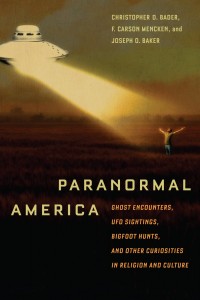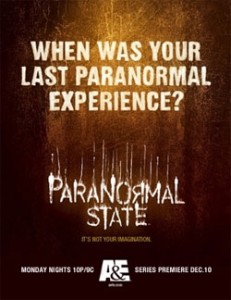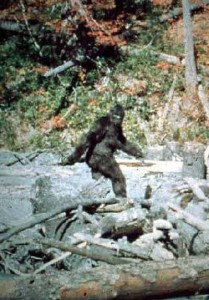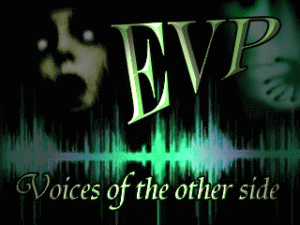 A visit to most bookstores, particularly large chain bookstores, will reveal a large collection of books that explore various facets of the paranormal. These phenomena and experiences are found throughout popular culture, and are frequently depicted in popular television programs and films. Recently, three scholars conducted sociological research that looked at those involved in the paranormal as a part of American religious culture.
A visit to most bookstores, particularly large chain bookstores, will reveal a large collection of books that explore various facets of the paranormal. These phenomena and experiences are found throughout popular culture, and are frequently depicted in popular television programs and films. Recently, three scholars conducted sociological research that looked at those involved in the paranormal as a part of American religious culture.
In the interview that follows Christopher Bader, F. Carson Mencken, and Joseph O. Baker discuss their research findings as compiled in their book Paranormal America: Ghost Encounters, UFO Sightings, Bigfoot Hunts, and Other Curiosities in Religion and Culture (New York University Press, 2010). Bader and Mencken are Associate Professors of Sociology at Baylor University, and Baker is Assistant Professor of Sociology at East Tennessee State University.
TheoFantastique: Thank you for your fine book, and for your willingness to discuss the results of your research. As you know, the paranormal has a marginalizing effect among those who give it any kind of credibility, even as a research topic. How did you come to develop an interest in the sociology of the paranormal, and why were you willing to engage the subject matter perhaps at the risk of your academic credibility?
Christopher Bader: I have long been interested in the paranormal as a sociological phenomenon as I grew up in the Pacific Northwest and was always fascinated with Bigfoot.
It is risky for scientists of many fields to take the paranormal seriously. However, we cannot claim to be especially brave. As sociologists we are interested in the behaviors of people, rather than the reality (or lack thereof) of a given phenomenon. So long as people believe in something and act upon that belief we are interested as sociologists. In other words, we are not really studying Bigfoot, ghosts and UFOs, rather we are studying people who believe in such things. We do not come down on either side of the fence with regard to the reality of paranormal phenomena, since doing so is irrelevant to our work. Certainly we have received our share of giggles and jokes as the result of our research, but the nature of our perspective protects our credibility.
 TheoFantastique: Is it possible that academics might make more room in the near future for the possibility of studying the paranormal from the perspectives of sociology of religion and religious studies as a legitimate subject matter?
TheoFantastique: Is it possible that academics might make more room in the near future for the possibility of studying the paranormal from the perspectives of sociology of religion and religious studies as a legitimate subject matter?
Christopher Bader: The answer depends upon what you mean by “legitimate subject matter.” The academic community has been slow to consider the paranormal seriously. As you noted in your previous question, academics are very fearful of their reputations and the paranormal is a ridiculed subject. I do not think you can expect to see academics seriously considering the potential reality of paranormal experiences in the near future.
However, I do believe that you will see increased interested in the paranormal as a cultural phenomenon, since belief in paranormal subjects is clearly growing in the United States. Just as academics, particularly social scientists, seriously study the effects of religion on other beliefs and behaviors, I believe you will see the paranormal receive increasing attention in the same manner—particularly within the sociology of religion.
TheoFantastique: How do you define the paranormal, and how are the various phenomena which comprise it differentiated from those in mainstream religions?
Joseph D. Baker: Defining the paranormal was one of the most difficult tasks in conducting this research. In some ways most of us already “know” what is considered paranormal because of implicit definitions employed in popular culture; however, on many issues the line is unclear. Ultimately we settled upon using a definition that draws on both science and religion as social institutions. If a particular belief (or by implication experience) is promoted by an organized, established religious tradition, then we considered it religious rather than paranormal. If the issue in question in not accepted by established religious traditions, then we utilized the stance of institutional science as a second cultural signifier. In our study, issues that are not accepted by either established religious traditions or institutional science were considered paranormal. It is important to note that these distinctions are cultural rather than intrinsic to the issues in question. For instance, what is the difference between a religious, angelic experience and certain types of alien encounter experiences? Most importantly, the attributed source of the experience and whether it is legitimated by the agents of an established religious tradition. Since these definitions are culturally constituted rather than inherent to the topics, what is considered “paranormal” may change over time or between cultural contexts. We addressed this briefly by looking at beliefs and experiences that are considered “religious,” but border on the cultural boundaries of the paranormal. Guardian angel experiences and belief in supernatural evil are examples.
TheoFantastique: What percentage of Americans believe in some form of the paranormal, and how do people come to accept these beliefs? More specifically, you mention Travis Hirschi’s ideas about deviance in relation to the conventional order. Can you also touch on his ideas about bonding to conventional society, and how those interested in the paranormal are more willing to engage in unconventional beliefs?
 F. Carson Mencken: Two thirds of Americans have at least one paranormal belief. We argue in our book that two factors drive paranormal belief and research: enlightenment and discovery. In terms of sociological theories, we use Hirschi’s social control approach in conjunction with Stark and Bainbridge’s work on religious compensators to explain how discovery and enlightenment would lead the disconnected to unconventional beliefs. Those who have strong bonds to society (people in power, high status careers, structural positions of authority and responsibility) are highly conventional in their lifestyles. It is an expected (i.e. normative) pattern. One aspect of living a conventional lifestyle to is believe and practice conventional beliefs/rituals (i.e. Christianity, Judaism in the United States). When someone who is expected to live a conventional lifestyle strays from expected (i.e. normative) behavior patterns, they risk sanctions (as Nancy Reagan did with her use of astrology in the White House). Those who are less connected to society, which may represent the poor, uneducated on one end, and the hyper-educated, non-conformist types on the other end, do not risk the same sanctions by pursuing alternative belief systems.
F. Carson Mencken: Two thirds of Americans have at least one paranormal belief. We argue in our book that two factors drive paranormal belief and research: enlightenment and discovery. In terms of sociological theories, we use Hirschi’s social control approach in conjunction with Stark and Bainbridge’s work on religious compensators to explain how discovery and enlightenment would lead the disconnected to unconventional beliefs. Those who have strong bonds to society (people in power, high status careers, structural positions of authority and responsibility) are highly conventional in their lifestyles. It is an expected (i.e. normative) pattern. One aspect of living a conventional lifestyle to is believe and practice conventional beliefs/rituals (i.e. Christianity, Judaism in the United States). When someone who is expected to live a conventional lifestyle strays from expected (i.e. normative) behavior patterns, they risk sanctions (as Nancy Reagan did with her use of astrology in the White House). Those who are less connected to society, which may represent the poor, uneducated on one end, and the hyper-educated, non-conformist types on the other end, do not risk the same sanctions by pursuing alternative belief systems.
But this in and of itself is not enough to spur people to the paranormal. There has to be a reason why people will seek alternative belief systems. One theory which applies to those of lower socioeconomic status is religious compensators. Since conventional religiosity is for and run by highly conventional people and provides many empirical rewards for this group, those from lower socioeconomic status groups will not gain many spiritual or conventional rewards from participating in conventional religion. Alternative beliefs systems can be empowering. The discovery of something spiritually unique (an unknown secret to the universe) that the rest of society does not have gives those from excluded groups a sense of purpose, a status as someone important.
Moreover, all humans are seeking enlightenment and discovery. New information helps us to reduce risk in our lives, and to make better informed decisions. Many paranormal practices (psychics, mediums, communication with the dead, astrology, etc.) are about giving people an insight into their future. Those groups not bound to conventional religious systems are freer to explore these alternative systems in order to gain information that may help them improve their lives.
Those who are hyper-educated, or cultural elites, may condemn conventional norms of behavior as too bourgeosie. Most cultural elites are early adapters. They tend to be the first to accept new ideas (e.g. evolution), new social norms (e.g. racial integration, inter-racial marriage, same sex couples), etc. The cultural elites are also the practitioners of new religious movements (NRMs). Their wide range of knowledge and experiences make them less threatened by unconventional ideas and practices. Moreover, their curious nature makes them drawn to discovery and enlightenment. This group is more likely to explore alternative ideas of reality (existence of UFOs, the possibility that another intelligent life form has mastered long-distance space travel, ESP, telekinesis, etc.). Their journey of discovery and enlightenment is not so much motivated by personal salvation (i.e., What does the future hold for me? ), as much as by the attempt to improve the human condition.
As with those from lower socioeconomic groups, the cultural elites are not as wed to conventional society. The risks involved with their exploration of alternative belief systems are not great, compared to someone who highly integrated into conventional society (such as a college president).
 TheoFantastique: Your research indicates that certain religious groups, such as Protestant evangelicals, are resistant to the paranormal. I must be an anomaly in this in that I come from a conservative Protestant background but still have an interest in the paranormal both as an academic subject matter and in the possibilities for the phenomena. Why is this religious group resistant to the paranormal?
TheoFantastique: Your research indicates that certain religious groups, such as Protestant evangelicals, are resistant to the paranormal. I must be an anomaly in this in that I come from a conservative Protestant background but still have an interest in the paranormal both as an academic subject matter and in the possibilities for the phenomena. Why is this religious group resistant to the paranormal?
Joseph D. Baker: The connection between organized religion and the paranormal is complicated and multi-faceted. Certain types of religious groups—those that are more exclusive in their outlook (i.e. as possessing the “one true” path to Truth)—tend to oppose paranormal beliefs. Accordingly, adherents of traditions such as evangelical Protestants hold relatively few of these beliefs. In some instances, members of such groups may even believe in the reality of paranormal topics, but attribute their existence to the work of Satan. Meanwhile, those who are decidedly irreligious are not likely to hold paranormal beliefs either, because they reject super-empirical views (or at least those beyond institution science) in general. So who then, religiously speaking, is most likely to believe in paranormal topics and be involved in paranormal subcultures? Those who are members of moderately “strict” religious groups and who express moderate levels of religious belief and practice. In other words, a member of a liberal Protestant congregation who attends religious services once a month is more likely to be interested in the paranormal than either a conservative Protestant who attends multiple services a week or an atheist who is not affiliated with a religious tradition and never attends services. The short answer to these complicated issues is that moderate religious involvement in a mainline religious tradition indicates a potential openness to the ideas of the paranormal, whereas intense religious involvement with a stricter religious tradition closes one off to the paranormal because these individuals have put all their “spiritual eggs in one basket.” The connections between religiosity and the paranormal could best be though of as “curvilinear.”
TheoFantastique: Were there any stereotypes about the paranormal that you had overturned as a result of your research?
Christopher Bader: We believe that our book conclusively overturns several stereotypes about the paranormal. One stereotype about paranormal believers and experiencers is that they are of below average education, suggesting that the paranormal is the province of people who are not sufficiently educated to “know better.” In fact, we find that education has little effect on most paranormal beliefs. In other words, people of higher levels of education are no more or less likely to believe in UFOs, Bigfoot, Atlantis and many other phenomenon as are those who never graduated high school. There are some exceptions. For example, people who never graduated high school are somewhat more likely to believe in ghosts and astrology, but in general the stereotype does not hold.
 There is also no evidence that income has a strong effect on most paranormal beliefs; paranormal beliefs are not limited to the suffering or downtrodden.
There is also no evidence that income has a strong effect on most paranormal beliefs; paranormal beliefs are not limited to the suffering or downtrodden.
TheoFantastique: Is it appropriate to think of the paranormal as a fringe phenomenon at present, and what do the future prospects look like for its popularity?
F. Carson Mencken: With two-thirds of the American population holding at least one paranormal belief, the paranormal is not fringe. In fact, in many ways it is quite normal. However, the paranormal is not an organized social movement. It poses no threat to conventional religious beliefs. There church of the paranormal is not going to supplant Christianity. In order for the paranormal to become a fringe movement, it must become better organized into a movement, with unified beliefs, rituals, etc. Currently, it has none of these. Here is what we can confidently say about the future of the paranormal in the United States. First, there are significant demographic trends among believers and practitioners of the paranormal. We document these trends throughout every chapter of our book. Second, the population of the United States is dynamic. Over the next thirty years we will see major shifts in the racial/ethnic and age compositions of the nation. The groups that are going to grow over the next 30 years are the groups that are currently the most likely to believe and practice the paranormal. Based on these two conclusions, we expect the percentage of the population who believes in the paranormal to grow. However, what is left to be determined is how the shift in the racial/ethnic and age compositions will affect the nature of social bonding. It may be that as these paranormal believing groups become larger in numbers they may also become more conventional in their social bonds, and hence their beliefs/practices. Only time will tell.
TheoFantastique: Gentlemen, thank you for your thoughts on this subject matter, and for your research that I hope you and others build upon.





3 Responses to “Bader, Mencken and Baker: Paranormal America”